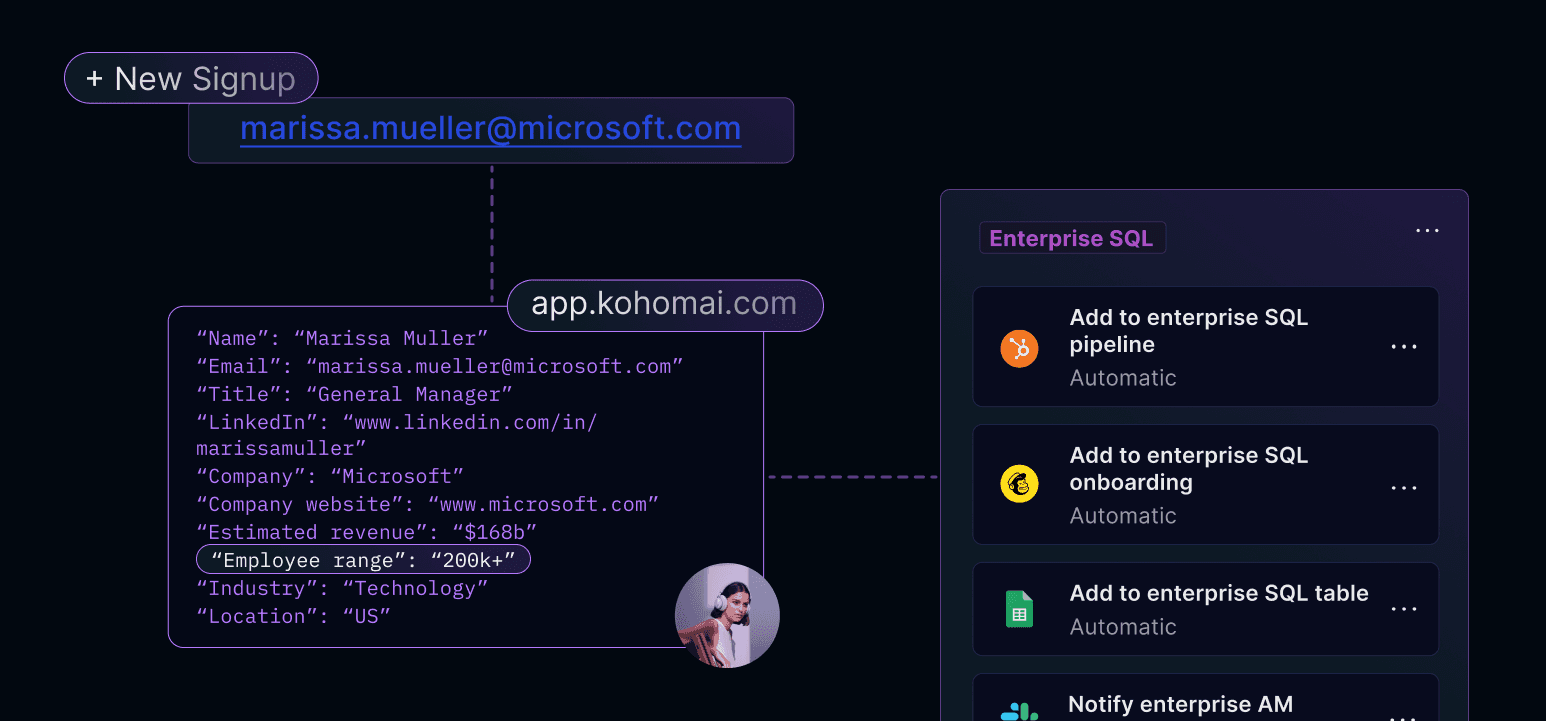
Crafting Personalized Journeys for Exceptional Customer Experiences

by
Brandi Marcene
Identify and convert your most valuable users
Sign Up
Introduction
Given that 25% of consumers say they are cutting back on the purchases of their favorite brands, providing a tailored customer experience is becoming crucial for success. Customers anticipate businesses to be aware of their particular requirements and preferences and to cater their interactions, products, and services accordingly.
Businesses need a vital IT/software infrastructure to support this level of customization. Such infrastructure can automate customer care tasks, deploy personalization tactics, and gather and analyze consumer data. Businesses can then design a seamless and unique customer journey that caters to the requirements and expectations of specific clients.
This article highlights the importance of businesses tailoring the customer journey. Moreover, we'll discuss examples of how companies tailor their interactions with customers.
What Are Personalized Customer Journeys?
Personalized interactions are those that cater to the unique wants and preferences of each customer. By doing this, you can make a memorable experience for customers that connects with them emotionally and encourages brand loyalty and repeat business.
You can design experiences that address their problems and give them a sense of recognition, comprehension, and respect from your business by comprehending the client journey and concentrating on providing value at every stage. Personalized customer journeys with the correct strategy can benefit your business and customers in the long run.
Why is Personalizing the Customer Journey Important?
In terms of the customer journey, personalization is tailoring goods, services, and interactions to every single client's particular requirements and preferences. Customers now demand personalized service at every touchpoint, from the first point of contact to the support provided after the sale. Making a customized client journey for your organization is possible with an adequate IT/software infrastructure.
A tailored client experience can help your company for several reasons:
• First and foremost, it can boost client loyalty and satisfaction. Customers will likely patronize a business again if it offers customized services that address their wants and preferences.
• Second, it can encourage the growth of sales and revenue. Sales can grow, and a customer's lifetime value can rise due to personalized experiences.
• Third, a customized client journey can make businesses stand out. One of the primary differentiators that set a company apart from its rivals in today's congested market is the ability to offer a customized experience.
• Positive internet reviews and word-of-mouth advertising can result from individualized encounters, further improving a business's reputation and brand image.
The ability to offer a customized client journey is essential for competitiveness in today's corporate environment.
Different Approaches Businesses Use To Personalize Their Customer Journey
A one-size-fits-all strategy will not result in a tailored client journey. However, we can provide suggestions to assist you in building an adequate IT/software infrastructure that offers a personalized experience, thereby making your consumers feel valued and special.
Using A Customer Relationship Management System
A critical component of creating an IT/software infrastructure that assures a customized client experience is implementing a customer relationship management (CRM) system. Throughout the customer lifecycle, a CRM system is a tool that enables businesses to organize and analyze client interactions and data.
A CRM system offers a single platform for gathering and keeping track of client information, such as contact details, purchase history, preferences, and behavior. A CRM system develops a unified image of each client by combining customer data into one database. As a result, customer support agents can quickly access pertinent consumer information, such as past contacts or purchasing patterns, and offer a customized experience.
Pros:
Classify customers based on their traits and behaviors
Use multiple communication modes to cater to each group's unique needs
Offer personalized and customized customer service
Automate redundant customer support activities such as follow-up emails
Improve work efficiency
Cons:
Implementing CRM tools can be costly
Need to train staff to use automation tools efficiently
Data Collection and Use for Customers
Customer data is another valuable element that can assist your company in giving clients a more individualized experience. Information about consumer behavior, preferences, purchasing history, and demographics are all included in this data category. By using this data, businesses may better understand the demands of their clients and customize their interactions with them.
Marketers can target specific client categories with their marketing initiatives by evaluating customer data. This might take the form of customized emails, social media promotions, or well-chosen commercials that speak to the needs and interests of the target audience.
Pros:
Allows you to offer tailored customer experience
Saves you time and money in customer interaction
Helps build customer loyalty
Cons:
May alter customer privacy
Opens doors for data breaches
Using Customer Segmentation
Customer segmentation groups consumers based on shared traits or habits, such as demographics, shopping habits, interests, or customer journey stages. Companies can develop customized advertising and support plans that better suit the demands and interests of each group by segmenting their consumer base.
Contrarily, personalization entails utilizing consumer information to offer a unique experience valuable to every customer. There are several ways to personalize content, including through emails, product ideas, recommendations, and targeted advertising.
Businesses may enhance the customer experience, boost engagement and response rates, and stimulate revenue growth by using customer data to segment clients and provide customized experiences.
Pros:
Simplifies data collection based on certain criteria, such as demographics
Customer targeting becomes easier as you send marketing messages only to the relevant group
Helps in creating effective marketing strategies
Cons:
Customer values and needs may vary within a group
One-size-fits-all for a certain group may diminish the efficacy of your marketing message
Predictive Modeling
A sophisticated analytical method, predictive modeling, examines previous data and forecasts future events using statistical algorithms and machine learning. Predictive modeling can foresee demands and offer proactive solutions before an issue emerges. This enables businesses to promptly and effectively cater to consumers' unique needs and preferences, resulting in more personalized customer care.
Pros:
Accurate data and future forecasts
Can analyze large sums of data in a short time
Automates the entire process
Cons:
Incomplete or biased prompts can affect data quality
The future forecasts are based on historical data, which may not comply with the changing times
Best Practices of Personalized Customer Journey
Examples are the best method to learn something. Take some inspiration from these business examples that have mastered providing a customized client experience.
Persona Nutrition Personalized Vitamin Pack
Isn't it preferable to take vitamins tailored to your individual needs based on the evaluation rather than a generic medication? With tailored nutrition delivered to your door, Persona Nutrition is a perfect illustration of a business that has found out how to provide a unique customer experience and stand out from the millions of products on the market.
Take their evaluation, provide some basic information about your health and way of life, and you'll receive your bottle of medications. Consult your doctor and perform some simple blood tests before making the purchase.
Netflix "Top Picks for You"
Every time you use Netflix, the suggestions system helps you choose something to watch by drawing on its understanding of your likes. It attempts to keep you on the website by making it simple to decide so you don't quit when you can't discover anything you enjoy.
How you interact with the service (such as your viewing history), other users who have your likes, or the time and date you often watch Netflix are all data that feed the Netflix algorithm and improve it. Every Netflix account is unique, giving users a distinctive experience and enticing them to continue using the company's for-fee streaming service. This is an excellent illustration of how content customization maintains consumer satisfaction.
Conclusion
Businesses should integrate new technology, foresee client demands, and deliver a remarkable experience to maximize customer experience personalization. Success depends on testing and refining many content iterations, encouraging long-term client relationships and loyalty. Kohomai provides a solution that is specific to GTM teams. The platform employs intelligent scoring algorithms, synchronizes with your systems without a hitch, accelerates lead qualification, and boosts conversion rates. Start using the revolutionary technology today to explore unlimited possibilities!





